What are SEO keywords? SEO keywords are the words or phrases that appear in your website’s content and make it possible for people to find your site with a search engine. A website is considered SEO optimized if its content matches search engine user intent. So, how do you choose SEO keywords? We’ll show you.
If you are a business in Philadelphia or the surrounding area, it stands to reason that you want your website to show up in Google’s results. How do you ensure that your website ranks well for the words that matter to your business? The answer is to “SEO” your website for the phrases that will generate the right kind of traffic. In this article, we’ll help answer many of the common questions about choosing the right SEO keywords. We’ll also help you decide whether to partner with a Philadelphia SEO Agency or tackle SEO yourself.
How to Choose SEO Keywords
“SEO keywords” is simply the technical term for the words that you want your website to rank for in Google. The first step in any SEO process is selecting the right SEO keywords to pursue, but the process isn’t as simple as you would imagine. Rather, it takes hours of research and planning to determine the best keywords to target for maximum impact. You must make hard decisions about those to include and those you will need to set aside for the future. These business-critical decisions help pave the way for a successful campaign.
To choose the right set of keywords, we recommend simple brainstorming exercises as the first step. Get started by putting yourself in the shoes of your potential audience. Reverse engineer their thought process and buyer’s journey to determine all of the possible permutations of words or phrases that they could input into Google to find your offering. To take it a step further, ask yourself and your co-workers some basic questions to help you select good keyword targets for search engine optimization. Here are a few questions to help generate a productive discussion:
- What is your website’s content about?
- How would a customer use a search engine to find what your website offers?
- Google Maps
- Google My Business
- Organic Search
- Google Shopping
- Google Reviews
- What do you think customers would search for in Google?
- What questions do customers have that they would want to know before selecting a company like yours?
- Which are your most popular pages, services, or products?
Helpful Hint! – Put a search box into your website. This simple feature will help your website users find the content they want quickly and show you what they’re searching for and how they are typing it. You may be able to find some gold nuggets in their searches that you have missed!
Keep your brainstorming notes handy. You’ll need it for completing the keyword selection process that we’ll cover later.
what not to do when choosing keywords
When looking for the right keywords, most business owners immediately want to pursue the broadest possible terms that summarize their business. For instance, “Philadelphia + Web Design,” “Philadelphia + Ecommerce Development,” or even “Philadelphia + SEO Agency” because those general keywords have the highest monthly search volume for a geographic region. In reality, unless you are an established business who has invested a considerable amount of time and energy in web marketing and SEO tactics over many years, there is not much chance that you will rank for short keywords targets like that.
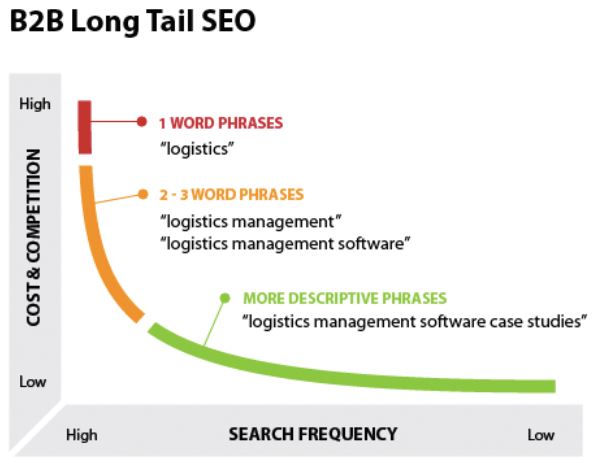
It will take many months or years of diligent SEO work to get to page #1 for a broad keyword like “SEO Agency.” However, targeting a keyword that isn’t so broad will take much less effort and time. These non-broad keywords are called long-tail keywords. These phrases are longer, as the name states, but they’re also more descriptive. For instance, instead of “SEO Agency,” an unranked firm could target “Best SEO Agency in Philadelphia.” By selecting a long-tail keyword phrase, you will cut many months or years off your effort because these phrases aren’t as competitive as the broad keywords. A company using this strategy could potentially hope to achieve position #1 on page #1 within six to twelve months!
A CLOSER LOOK AT long-tail keywords
Long-tail keywords are search phrases that rely on longer search queries. They are search terms that have lower usage volume, and therefore have fewer companies targeting them from an SEO perspective. But wait, I want more traffic to my site, not less! Interestingly, the vast majority of Google searches are very specific long-tail searches. In fact, about 20% of all searches in Google each day are unique — they have never been searched before in the history of Google. Pretty amazing!
It’s true that long-tail key phrases have less search volume. However, given a choice between being on page #50 for a very high search volume keyword versus being on page one for a much lower search volume keyword, we recommend pursuing a page one target. On page 50, you will get precisely zero visitors. On page #1, even for a very low search volume keyword, you will generate fewer, but highly qualified visitors. Long-tail keywords are a great place to start your search engine optimization process because you will likely achieve some level of ranking and traffic relatively easily and quickly.
Long-tail keywords are also excellent keyword targets for sites with an established SEO presence. The good news is that these long-tail search terms are often highly-focused phrases, which yield high-quality traffic to your website. Long-tail keyword searches are different from short “head keywords” in that they usually focus on a very specific search query or server intent. Because of that, traffic from these keywords tends to have a significantly higher conversion rate than broader, shorter keyword phrases.
In addition to bringing visitors to your website sooner, targeting the right low-search volume keywords will set you up to go after those higher volume keywords in the longer term. This practice will become even relevant when we discuss “content clusters” and “SEO pillar pages.”
When selecting SEO Keywords, include your LOCATION
SEO keywords can be very competitive, which means many companies are vying for the top spots. A great strategy you can use to reduce your competition is to pursue less competitive keywords. An easy way to do this is to focus your search term around a specific region.
We recommend that you take time and consider if all or part of your audience may be using a regional modifier in their keyword searches. If so, select the largest town or city names where your client base resides. For instance, IQnection’s office is located near the city of Philadelphia. For SEO purposes, we talk about ourselves as a Philadelphia SEO Agency, even though we can perform SEO services for any company all around the world. However, our office isn’t located in Philadelphia — we are in a suburb called Doylestown. “Doylestown SEO Agency” just doesn’t get the same amount of search traffic as going for a much larger geographic location such as Philadelphia.
Instead of exclusively saying that we are from Doylestown, we reference the fact that we are near Philadelphia. We intentionally made this choice so that we would show up for SEO keyword searches that include the term “Philadelphia SEO Agency.”
Yes, it would be nice for us to rank for “SEO Agency” without a regional modifier and secure traffic from a broad keyword that gets 8,100 searches for that per month. But, the likelihood of us ranking in the top three spots for that keyword is low. However, we are a substantial regional player in the Philadelphia market, so we have targeted that region when choosing the right SEO keywords for our agency.

It is much more likely that we will rank for keywords when we append our region to the term. That’s why we pursue the following list of keywords and focus our energy on “SEO Agency Philadelphia.” We suggest this same tactic with our clients. We help them understand the competitive nature of SEO and how to select keyword targets that are appropriate for their business.
How to choose SEO keywords
- Use your brainstorming notes from above to help you make a list of your core services, products, or relevant topics based on your company’s offerings. Keep this list short. These will be called your “head keywords.”
- Next, make a list of the common question people would have when thinking about your service. You can use tools like Google’s “People also ask” to help you find some of these common questions.
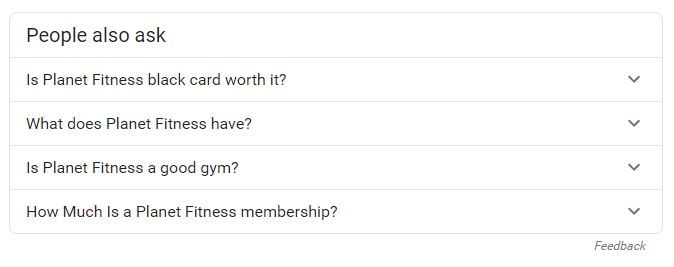
- For each of your “head keywords,” think of every possible variation of how people would say them. For instance, SEO could also be Search Engine Optimization, Local SEO, Philadelphia SEO Agency, or SEO Near Me. This list will be LONG!
- Think about various ways that people could search for your offering using plus signs and minus signs, such as Philadelphia + SEO Agency.
You Have your SEO KEYWORD LIST. now what?
This next step is critical, and it’s one that inexperienced SEO agencies skip. Now that you’ve chosen your SEO keywords, you need to group them by SEO intent. SEO intent grouping essentially means that you group similar keywords or keyword phrases into clusters so that you can address them on one website page or cluster.
For instance, consider the following searches.
What are SEO Keywords
Definition of SEO Keywords
How to Choose SEO Keywords
These keyword searches essentially all have the same searcher intent. They are all related to learning about SEO keywords. The visitor is looking for a basic understanding of how SEO keywords function or simply learn what they are. To answer these searcher intents, try to use these keywords in the content you are creating. Incorporating keywords into your content will help your site visitors know that you have the answer to their query.
Map keywords to pages in your site and find gaps in your keyword strategy
Once you have a list of keywords that you are working on, look for holes in your content. You can do this by mapping every single keyword to a page on your website. This process can be laborious, but it will quickly identify any pages on your website that do not have keywords mapped to them. This mapping process is especially helpful if you have a large website with lots of pages. If there have been many rounds of website changes by multiple hands over the years, it can be challenging to keep track of all of your content. By mapping keywords to specific pages, you can identify which pages are the most likely to generate the most search engine traffic from the right kind of user — and which won’t.
We find MS Excel is a great tool for the keyword mapping process. You can import your list of keywords into column A, and include Keyword volumes into Column B. When you are done, you will get a spreadsheet that will look something like this:
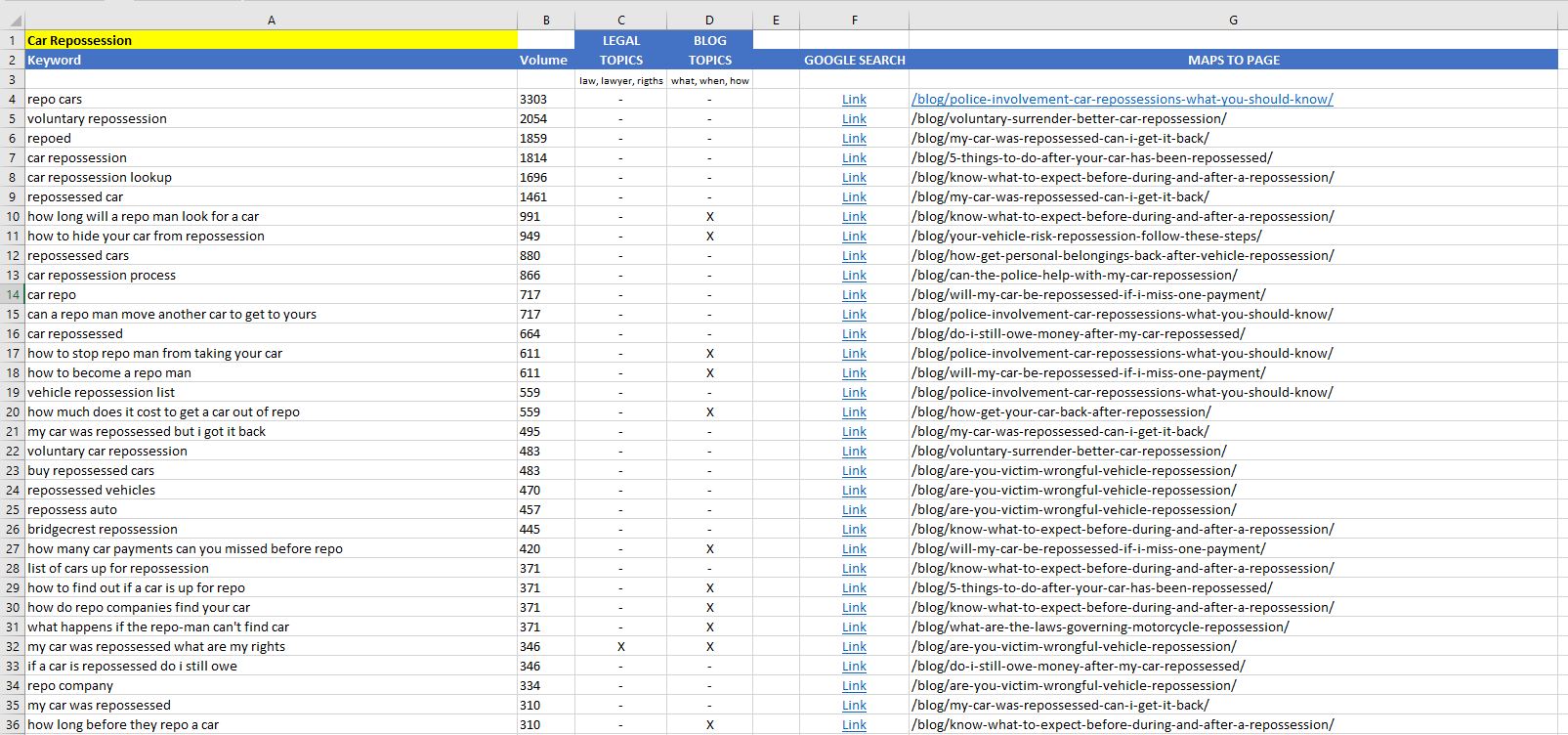
Look for gaps in your keyword Keywords by examining competitors
Another helpful way to choose keywords is to look at the ones your competitors are pursuing. SEM Rush has a wonderful keyword gap tool that lets you see all these competitor keywords. It will then let you compare that list of keywords to the phrases you’re pursuing to identify gaps and opportunities.
In the diagram below, we can see that Planet Fitness ranks for a considerable amount of keywords. However, its competitor fitness clubs share a core group of them. Using this tool, you can identify possible keywords that you have missed — those that your competitors are targeting.
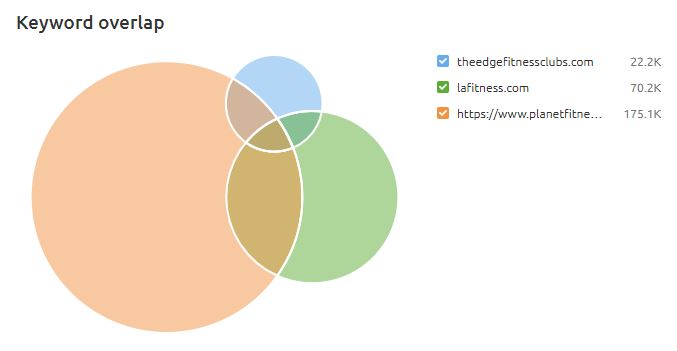
For our clients, we do a competitive keyword analysis in both directions: keywords that competitors are using and those that competitors are not using. This way, we can identify potential keyword opportunities that competitors are not fully leveraging.
What are the best keyword research tools?
When learning how to choose SEO keywords, some online tools can add value and insight to the process. We rounded up our favorite keyword research tools that we use regularly.
 SEM Rush – We use this SEO keyword tool almost daily and have set up individual projects for each of our clients. We love it because it provides a variety of keyword metrics. One of the best features is the keyword SERP tracking, which will give you daily insight into how your keywords are performing. They offer paid and organic search data, including cost per click, keyword volume, and related keywords. It’s also handy for competitive analysis because it shows which keywords your competitors have ranked in the top spots.
SEM Rush – We use this SEO keyword tool almost daily and have set up individual projects for each of our clients. We love it because it provides a variety of keyword metrics. One of the best features is the keyword SERP tracking, which will give you daily insight into how your keywords are performing. They offer paid and organic search data, including cost per click, keyword volume, and related keywords. It’s also handy for competitive analysis because it shows which keywords your competitors have ranked in the top spots.
 Google Keyword Planner – Google’s keyword planner tool is a highly intelligent resource for choosing the right SEO keywords. This tool shows you how often users search keywords and how those trends have changed over time. It also shows you related keywords and allows users to filter out negative terms or filter keywords by volume, cost per click, or competitiveness.
Google Keyword Planner – Google’s keyword planner tool is a highly intelligent resource for choosing the right SEO keywords. This tool shows you how often users search keywords and how those trends have changed over time. It also shows you related keywords and allows users to filter out negative terms or filter keywords by volume, cost per click, or competitiveness.
 Moz Keyword Explorer – Moz’s planner tool is another excellent resource for keyword research. Moz tools allow you to expand your understanding of keywords as it provides countless suggestions for keywords. This tool will also show you related keywords and filters based on keywords by volume, cost per click, or competitiveness.
Moz Keyword Explorer – Moz’s planner tool is another excellent resource for keyword research. Moz tools allow you to expand your understanding of keywords as it provides countless suggestions for keywords. This tool will also show you related keywords and filters based on keywords by volume, cost per click, or competitiveness.
 Google Trends – Google Trends is a fantastic tool for determining whether a keyword is gaining or losing popularity over time. This option is especially useful for businesses with a long list of keywords and frequently evolving industries. With Google Trends, you can see how popular keywords have performed over time and the frequency of searches in various countries, states, or cities. This tool also allows you to see which similar terms, such as “attorney” and “lawyer,” that users searched most often.
Google Trends – Google Trends is a fantastic tool for determining whether a keyword is gaining or losing popularity over time. This option is especially useful for businesses with a long list of keywords and frequently evolving industries. With Google Trends, you can see how popular keywords have performed over time and the frequency of searches in various countries, states, or cities. This tool also allows you to see which similar terms, such as “attorney” and “lawyer,” that users searched most often.
Let a Philadelphia SEO agency CHOOSE SEO KEYWORDS FOR YOU!
An SEO agency like ours will help your website rank at the top of Google’s search engine results pages for the keywords that matter to you. They can explain the process they will use to achieve rankings. However, they won’t be able to give you an exact timeline for how long the process will take because some businesses take longer than others to rank based upon the competitiveness of the keywords and your industry.
The best Philadelphia SEO agencies make it easy to choose the SEO keywords that are most likely to generate a measurable uptick in the kind of traffic you need. If you’d like to leverage our team of SEO gurus to help you put the best keywords to work for your company, contact us today.









